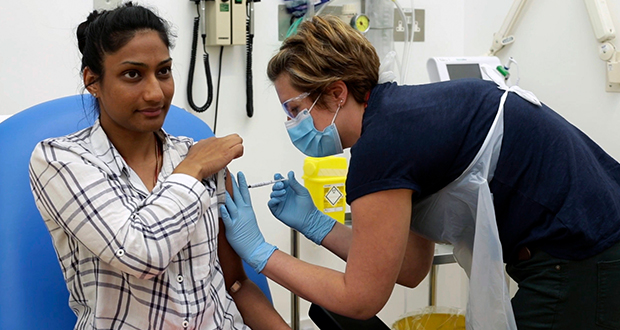A breakthrough has been made in the race to find a coronavirus vaccine as a new drug developed by academics from the university of Oxford is shown to induce an immune response, prompting the UK government to order 100 million doses.
The vaccine provoked a T cell response within 14 days of vaccination (white blood cells that can attack cells infected with the SARS-CoV-2 virus), and an antibody response within 28 days.
Ninety per cent of participants showed developed neutralising antibodies after one dose. Ten people were then given a second and 100 per cent of those participants' blood showed neutralising activity against the coronavirus.
“The Phase I/II data for our coronavirus vaccine shows that the vaccine did not lead to any unexpected reactions and had a similar safety profile to previous vaccines of this type. The immune responses observed following vaccination are in line with what previous animal studies have shown are associated with protection against the SARS-CoV-2 virus, although we must continue with our rigorous clinical trial program to confirm this in humans,” said Professor Andrew Pollard, from the Oxford research group.
“We saw the strongest immune response in the 10 participants who received two doses of the vaccine, indicating that this might be a good strategy for vaccination.”
These results do not mean the drug is definitively effective against COVID-19, but it does mean the vaccine is safe to administer and trial with a larger group of people. More than 10,000 people will take part in the next stage of trials in the UK.
Deputy Chief Medical Officer Nick Coatsworth said safety and effectiveness would be key to finding a suitable drug.
"It looks very encouraging and I know Professor Andy Pollard and his group of researchers there, they are absolutely world-class," he told ABC television on Tuesday.
The vaccine is intended to induce antibody and T cell responses so it can attack the virus and infected cells.
"They're the two parts of the immune system that will work in concert to protect against COVID-19," Dr Coatsworth said.
"So what we're actually seeing is that those two elements of the immune system are boosted by the vaccine."
He said the next step would be to see the boosted immune responses translate into protection from coronavirus.
This news come as another group announced they have showed promising results for a coronavirus treatment that restores the lung's immune response after getting the virus, with some describing this treatment as a “game changer”.
The inhaled drug, SNG001, reduced the number of patients needing intensive care treatment. People who were given the drug showed 79 per cent lower risk of developing severe disease and were more than twice as likely to recover from COVID-19 as those on the placebo, according to The Independent.
The drug is administered using a nebuliser and although the full results are yet to be released – and is not yet peer-reviewed – Tom Wilkinson, professor of respiratory medicine at the University of Southampton and trial chief investigator calls the finding a “game changer”.
“The results confirm our belief that interferon beta ... has huge potential as an inhaled drug to be able to restore the lungs’ immune response, enhancing protection, accelerating recovery and countering the impact of Sars-CoV-2 virus,” he said.
The drug reduced breathlessness and increased the likelihood of hospital discharge, from six days versus nine days for those receiving a placebo.
This drug could be important for the treatment of hospitalised COVID-19 patients around the world as the UK government looks to fast-track the drug's approval with medical regulators.
Do you have an idea for a story?Email [email protected]
 Aged Care Insite Australia's number one aged care news source
Aged Care Insite Australia's number one aged care news source

